Gold loan companies in Kerala have grown rapidly, offering families a quick way to access cash without selling their jewelry. But the appraisal process for a gold loan is very different from selling gold. If you understand how gold loan appraisal works, you can make smarter choices and avoid hidden costs.
Gold Loan Appraisal vs. Selling Gold
When you visit gold loan companies in Kerala, their main goal is to value your ornaments as collateral:
- Purity Check: Most lenders test purity with XRF machines. A 22K chain fetches more than an 18K one.
- Net Weight: Only the gold weight counts. Stones and enamel are excluded.
- Loan-to-Value (LTV): RBI allows a maximum of 75% of market value. For example, 20 grams of 22K gold can get you a loan equal to 75% of its value.
When you sell gold, jewelers focus on resale:
- You are paid based on live gold rates.
- Making charges may reduce the payout by 2–5%.
- Stones and gems may carry value—ignored in gold loans.
👉 The key is: Gold loan companies in Kerala value ornaments as collateral, while jewelers value them for resale.
What You Should Watch Out For
- Compare interest rates. Some firms charge 7%, others over 24%.
- Always check if weighing is done in front of you.
- Ask about foreclosure fees before pledging.
- Confirm how interest is calculated.
Case Study: Kerala’s Gold Loan Market
According to the RBI 2023 report, Kerala accounts for nearly 20% of India’s gold loan market. Muthoot Finance and Manappuram Finance are the largest players. This shows how strongly families in Kerala depend on pledged gold for financial security.
“Research shows that Kerala households hold over 400 grams of gold per capita—more than twice the national average.”
FAQ
Q1. Do gold loan companies in Kerala pay less than jewelers?
No, they don’t buy gold. They only lend against it, at 75% of its value.
Q2. Is pledged gold safe?
Yes, RBI-regulated firms insure pledged gold. If stolen, compensation is provided.
Q3. Should I pledge or sell my ornaments?
Pledge if you need short-term funds. Sell if you want full value and no repayment.
Learn about hallmarking in our guide: Understanding BIS Hallmark: What It Means for Your Jewellery
Read more on purity differences: 24K, 22K, 18K: What Every Malayali Gold Buyer Must Know
Before pledging, check our Gold Buying Checklist for Malayalis
Suggested Reading:
Reserve Bank of India – Guidelines on Gold Loans
Small Luxury Hotels FAQ
Introduction
This small luxury hotels FAQ answers common questions about boutique stays. It explains definitions, differences with large chains, and which services to expect. In addition, it covers family options, sustainability, and tips on finding the right property.
What defines a small luxury hotel?
- Fewer than 100 rooms.
- Personalized attention and privacy.
- Strong links to local design.
- Locations in unique urban or rural areas.
As a result, travelers often choose them for a more intimate experience. Moreover, their distinctive style sets them apart from standardized hotels.
Why choose a small luxury hotel?
Personal service
Staff remember guest details, therefore creating a sense of familiarity.
Calm spaces
Unlike large hotels, these properties feel quieter, so you can relax more easily.
Local culture
For example, menus highlight regional produce, and interiors reflect local crafts.
In addition, many guests return because the experience feels authentic.
How do small luxury hotels differ from large chains?
Guest experience
Small hotels provide tailored attention, while chains rely on uniform systems.
Property identity
Each boutique hotel has its own theme. On the other hand, large chains repeat formats worldwide.
Dining approach
Menus change seasonally and locally. Therefore, guests enjoy fresh variety instead of standard global menus.
Are small luxury hotels only for leisure stays?
Business features
- Lounges double as meeting rooms.
- Private dining options support work dinners.
Digital needs
- Fast Wi-Fi supports remote work.
- Quiet spaces help concentration.
Because of these advantages, small luxury hotels appeal to both business and leisure travelers.
What services can you expect?
- Concierge services for tours and dining.
- Fine dining menus with seasonal ingredients.
- Spa and wellness treatments.
- Added extras like minibars and welcome gifts.
Moreover, services shift depending on location. For example, a city hotel might offer cultural tours, while a rural retreat offers farm experiences.
Are small luxury hotels family-friendly?
Options for families
- Connecting rooms for parents and children.
- Child-friendly amenities such as menus or games.
Adults-only stays
- Some properties focus on privacy.
- Guests find peaceful, child-free environments.
Therefore, always check booking policies, because each hotel sets its own approach.
Do these hotels support sustainability?
Sourcing and dining
Farm-to-table meals reduce transport impact. In addition, guests enjoy fresher produce.
Environmental focus
Plastic use is restricted, while refillable bottles are encouraged. Smart energy systems reduce wastage.
Local involvement
Hotels support the community by hiring regionally. As a result, growth extends beyond the property.
How do you find the right small luxury hotel?
Define needs
Decide if food, spa, culture, or privacy is your top priority.
Check guest feedback
For example, repeat reviews about service often signal consistency.
Compare value
Packages may include meals, transfers, or early check-in. Therefore, higher prices can still deliver stronger value.
Are small luxury hotels worth the price?
Value of service
Guests pay for attention, comfort, and privacy. Moreover, experiences feel tailored and unique.
Extras add value
Some hotels include exclusive experiences or benefits. Finally, weigh these extras against nightly rates.
As a result, many travelers feel these hotels justify their price when quality matters most.

